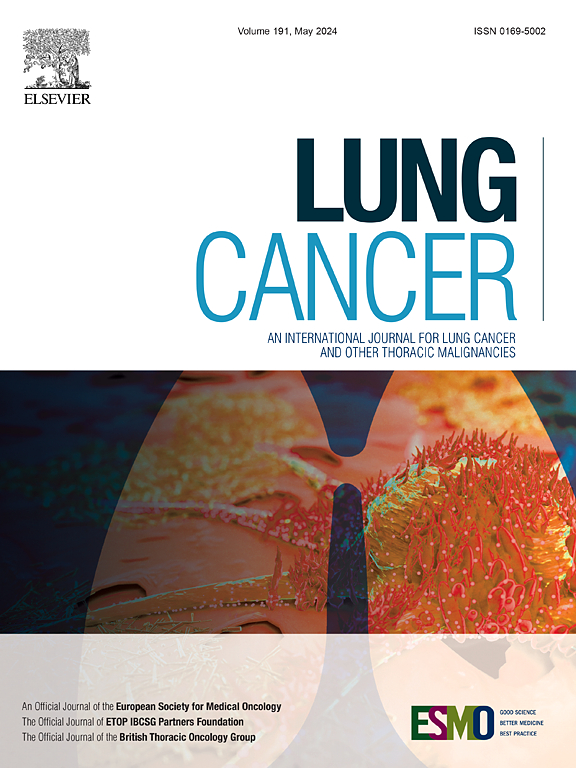Identifying and exploring patient engagement interventions for people diagnosed with lung cancer: A rapid systematic review
IF 4.5
2区 医学
Q1 ONCOLOGY
引用次数: 0
Abstract
Purpose
To identify and synthesise evidence describing patient engagement interventions that have been used to support people diagnosed with lung cancer.
Methods
A rapid systematic review was conducted following guidance from the Cochrane Rapid Reviews Methods group and reported using the Preferred Reporting Item for Systematic Review and Meta-analysis (PRISMA) checklist. Keyword searches were performed in MEDLINE and supplemented by Google Scholar searches. Searches were restricted to peer-reviewed articles conducted in high-income countries and published in English. Data was extracted using the Template for Intervention Description and Replication (TIDieR) checklist, tabulated, and narratively synthesised. Data extraction and quality assessment were conducted by two independent reviewers.
Results
Thirty-four studies were included in the final analysis. Studies show a positive impact of interventions across a range of engagement outcomes including patient and caregiver knowledge, patient activation, and decision making. Interventions were also shown to reduce healthcare use, reduce symptom severity, and improve psychosocial outcomes. Barriers to implementing interventions included: the timing/delivery of interventions, poor digital literacy, system and technical barriers, and poor uptake and adherence by advanced patients. Factors supporting intervention implementation included: participatory research/co-production approaches, providing training and support for those delivering interventions, involving caregivers, and employing broad recruitment strategies. The overall risk of bias for studies ranged from moderate to high.
Conclusion
The identified interventions demonstrate significant potential for enhancing patient engagement and improving outcomes for lung cancer patients. Findings from this review will support the design and implementation of future interventions to help people with cancer engage with healthcare.
Review registration: The protocol was registered on the International Prospective Register of Systematic Reviews (PROSPERO) (CRD42024521052) on 06/03/24.
识别和探索肺癌患者参与干预措施:快速系统回顾
目的识别和综合描述用于支持肺癌确诊患者的患者参与干预措施的证据。方法根据Cochrane快速评价方法组的指导进行快速系统评价,并使用系统评价和荟萃分析首选报告项目(PRISMA)清单进行报告。在MEDLINE中进行关键词搜索,并辅以谷歌Scholar搜索。搜索仅限于在高收入国家进行的同行评议文章,并以英语发表。使用干预描述和复制模板(TIDieR)检查表提取数据,制表并叙述合成。数据提取和质量评估由两名独立评审员进行。结果34项研究纳入最终分析。研究表明,干预措施对包括患者和护理人员知识、患者激活和决策在内的一系列参与结果产生了积极影响。干预措施也显示减少医疗保健使用,减轻症状严重程度,改善社会心理结果。实施干预措施的障碍包括:干预措施的时机/交付、数字素养差、系统和技术障碍,以及晚期患者接受和依从性差。支持实施干预措施的因素包括:参与式研究/联合生产方法,为提供干预措施的人员提供培训和支持,让护理人员参与,以及采用广泛的招聘策略。研究的总体偏倚风险从中等到高不等。结论已确定的干预措施在提高患者参与度和改善肺癌患者预后方面具有显著的潜力。本综述的发现将支持未来干预措施的设计和实施,以帮助癌症患者参与医疗保健。审查注册:该方案已于24年6月3日在国际前瞻性系统审查注册(PROSPERO) (CRD42024521052)上注册。
本文章由计算机程序翻译,如有差异,请以英文原文为准。
求助全文
约1分钟内获得全文
求助全文
来源期刊

Lung Cancer
医学-呼吸系统
CiteScore
9.40
自引率
3.80%
发文量
407
审稿时长
25 days
期刊介绍:
Lung Cancer is an international publication covering the clinical, translational and basic science of malignancies of the lung and chest region.Original research articles, early reports, review articles, editorials and correspondence covering the prevention, epidemiology and etiology, basic biology, pathology, clinical assessment, surgery, chemotherapy, radiotherapy, combined treatment modalities, other treatment modalities and outcomes of lung cancer are welcome.
 求助内容:
求助内容: 应助结果提醒方式:
应助结果提醒方式:


